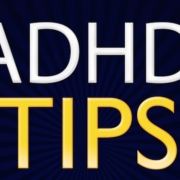Obtain a thorough evaluation by a professional with experience diagnosing and treating ADHD
Education:
Educate yourself as much as you can about ADHD and its
management. Read books, talk to professionals, and research on the internet.
Medication:
Stimulant medication (methylfenadate, amphetamines) and nonstimulant
medications (atomoxetine) have been shown to be effective. Seek a
qualified physician to evaluate use of medication.
Parent-Training/Coaching:
Parent-training or coaching is an affective treatment for ADHD.
Parenttraining/coaching helps decrease parent/child conflict, child defiance, and disruptive behaviors.
Parent-training/coachingalso helps reduce parent stress and household stress in general. Parenting strategies includecontingency management, effective use of commands, transition planning, positive attending, behavior
management plans, and various monitoring programs.
Psychotherapy:
Psychotherapy is helpful for children, adolescents and adults by helping them gain a better
understanding of the nature of ADHD, its management, and how it has influenced who they are today.
It is also useful to help with medication compliance.
Social-skills Training:
Accommodations and environmental changes. Some strategies to help your daughter with ADHD achieve include:
-Organizing information and note taking: Students with ADHD
require extra assistance to organize and prioritize their homework.
At home, parents can help organize and prioritize assignments and
record important dates onto a home calendar.
-Providing a quiet environment: Make sure that the homework environment is quiet with
minimal distractions.
-Maintaining a routine: Routine brings order and order assists in the facilitation of focus.
Homework should be completed at the same time each day in the same quiet environment.
-Break into parts: The academic rule of thumb is that there should be 10 minutes
of homework added on for each grade level, i.e., 4th graders should be able to handle
40 minutes of homework each night. However, for a child with ADHD, 40 minutes may
be too long to sustain attention on one given subject area. Therefore, homework should
be ‘chunked’ into smaller segments.
-Manage time and set goals: After helping your child break their homework into smaller
segments or chunks, set time completion goals and accuracy goals. Use a timer to
externalize the time cue and provide the additional structure.
-Rewarding: Use positive reinforcement. Keep your attention focused on positive behavior. Set clear reward for homework completion and even for completion of each homework
‘chunk’ discussed above.
-Consequences: Adhere to the plan and set up realistic consequences for not completing the
homework.
-Communicating: Communication between the teacher, parent, and child is critical. Establish
a weekly or even daily report card which reports missing assignments, test grades, and up
coming projects and tests; and
Seek professional help: Know when it is time to ask for assistance from professionals
ADHD Coaching is available online, by phone , and in-person.


